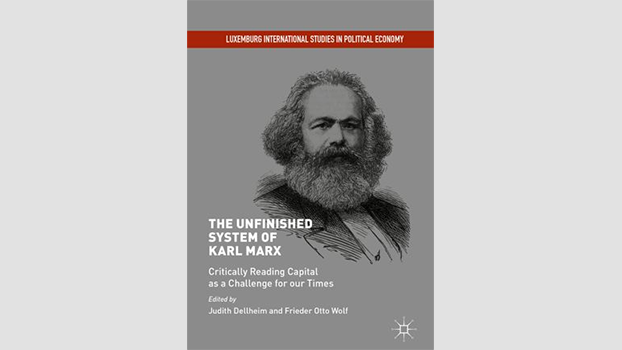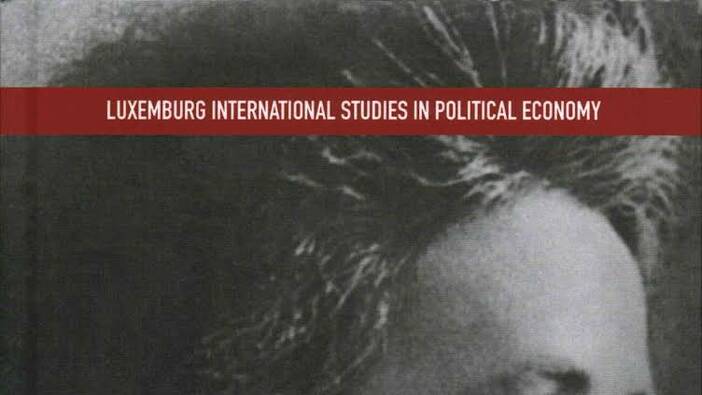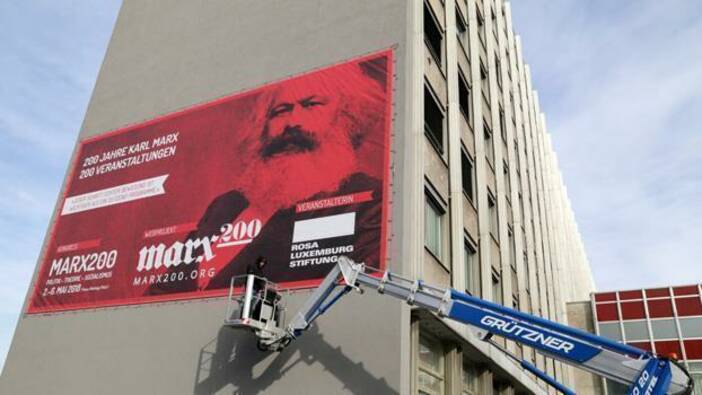
On time, by Marx’s birthday, we have put the book „The Unfinished System of Karl Marx. Critically Reading Capital as a Challenge for our Times“, supported by the Rosa Luxemburg Foundation, on the books’ table (please see the links and the table of content in the end of this text). We also had the opportunity to present the book on the conference „Marx200“- conference organized by the Foundation. We are happy about the request to present the project some more. For doing so, we could win most of the authors contributing to the book.
Our book is the second one in the series „Luxemburg International Studies in Political Economy“ edited by Jan Toporowski and Frieder Otto Wolf. It started with „Rosa Luxemburg: A Permanent Challenge for Political Economy. On the History and the Present of Luxemburg's 'Accumulation of Capital'”, published in 2016 and also supported by the Rosa-Luxemburg-Foundation. The Call for Papers for our third book will be go viral soon.
The series has two aims: Firstly to promote the the tradition of Marx‘s critique of political economy, while being open for any new facts, questions, ideas, and democratic discussions, and look for inspiration from the history of political economy. Secondly, to renew the understanding of modern bourgeois societies, and the role of finance in it, among progressive and socialist forces, in order to break out of deeply defensive policy positions against a barbaric future – and thereby to mitigate the present social and global problems and to find ways to solve them in a democratic, just and solidarity-based way, so that every human being can live in freedom, equality and solidarity, while protecting the natural environment.
Our call for papers for the book on Marx started with some words by Rosa Luxemburg: ‘In accordance with Marx’s whole attitude, his book on Capital is not a Bible containing final and unalterable truths, but rather an inexhaustible source of stimulation for further study, further scientific investigations and further struggles for truth’[1]. These are the first sentences of her contribution to Franz Mehring’s Karl Marx: The Story of His Life, published in 1918 (1935 in English) to mark the occasion of Marx’s 100th birthday. That we now have returned to Luxemburg on the eve of his 200th birthday has been due to our interest in volumes II and III of Capital (which had been rendered readable by Engels, but nevertheless remained fragmentary), as a ‘stimulus to thought, to criticism and self-criticism, and this is the essence of the lessons which Marx gave the working class’, as Luxemburg has formulated it[2].
Judith Dellheim and Frieder Otto Wolf have put two questions to the authors of this book:
- a) What do you think that a contribution on occasion of the 200th birthday of Marx should convey as a central message?
- b) Which is the message that you would want to send to the current generation of “Marxist” and/or better “Marxian” authors?
To which her own answers have been:
(a) Let us learn from Marx to ask, to search and to act politically. Let us regard him like a friend with strengths and weaknesses. Let us understand his heritage like something very unfinished challenging you to ask, to search and to act politically.
b) Regard your work as an offer to get a collective searching process under way for possibilities to act politically in favour of the interest of the majority of the global population, and above all in the interest of the socially and globally weakest.
The answers she has received:
Patrick Bond
a) The inexorability of over-accumulation, financialisation and imperialism under capitalism, and the numerous contradictions therein that are now bubbling to the surface.
b) The theory of crisis has never been more important than in 2018!
Michael Brie
Marx must be read strategically, because he intended to write for political effect. To this end, the cosmos of the intrinsic exegesis of works must be exploded. Friedrich Engels said at Marx' grave: "[...] Marx was above all revolutionary. To participate, in one way or another, in the overthrow of capitalist society and the state institutions created by it, in the liberation of the modern proletariat, to which he had first given an awareness of his own situation and needs, an awareness of the conditions of his emancipation - that was his real calling in life. The fight was his element. And he fought with a passion, a tenacity, a success like few."[3]
This struggle of Marx was embedded in the broad stream of the socialist and workers movement of his time. He drew most of his impulses from this socialist stream. He wanted to give this stream consciousness and direction. Who does not know this stream in its breadth and does not take it seriously, can only misunderstand Marx. Marx was part of the socialist, the workers', the revolutionary movement of his time. But he was not the whole of it and should not be taken for the whole. Reading 'Marx' strategically, means reading it as an intervention in the strategic discourses of the left of his time. Without a re-reading by Pierre-Joseph Proudhon and Michail Bakunin, Flora Tristan and Ferdinand Lassalle, John Stuart Mill and Louise Michel, Louise Otto-Peters and Alexander Herzen this will be impossible. Marx remains completely uncomprehensible, if his opponents are not taken seriously in their independence and performance. In retrospect, his "enemy brothers" and all the "sisters", who still receive too little attention, prove to be comrades on a common path.
Marx not only created "right" consciousness, but also contributed to the mis-shaping of intra-socialist oppositions. Only together could the socialist and communist forces in the 19th century produce or fail to produce the indispensable contradictions of a living socialism. Marx has worked out certain poles of this contradiction and brought them to the term. He was successful where he brought these poles to bear as indispensable elements within the whole. He failed politically where he wanted to impose them as sole ruling views and "destroy" his opponents. Reading Marx strategically therefore means to become aware of the possibilities and of the limits of his strategic interventions in order to become able to intervene as the left of the early 21st century in a way of solidarity.
Riccardo Bellofiore
a) On occasion of the 200th birthday of Marx, the point is to understand what the most important contributions and the areas are, where he has pursued innovative work. I focus on the critique of political economy. From the theoretical point of view, I think that – paradoxically – the most essential contributions of Marx are to be found exactly in the most contested parts of his oeuvre, where indeed there are problematic elements. All this notwithstanding, his most precious legacy is his value theory of labour (the labour theory of value, but re-read from the point of view of the form determination of labour under capital) and his theory of money (to be distinguished from currency). Marxians must insist that Marx was practically the only economist wishing to link internally value and money, so that the one cannot be properly defined without the other. His monetary [labour!] theory of value must be reconstructed as a macro-monetary theory of capitalist production of (surplus)value, taking into account the monetary heretics of the XXth and XXIth century. These philosophical foundations also require a new investigation, especially of the ways in which Marx uses Hegel, while at the same time breaking with him.
Second, Marx's crisis theory must be re-read seeing in the tendency of the rate of profit to fall a unitary element, where however, after capital's changes contemporary to and following the Long Depression of the XIXth century, the counter-tendencies are grounded in the tendency, but win over: This opens a way to a stage theory of capitalism, where in each stage the forces driving the upswing are contradictory and in the end lead to the decline and another great structural crisis (the Great Crash of the 1930s following trustified capitalism, the Social Crisis leading to the Great Stagflation of the 1960s and 1970s following so-called Fordism, the Great Recession following so-called Neoliberalism (which actually was a very political configuration with a very active State, a financial and privatised Keynesianism). In Neoliberalism, contrary to the vulgata, some important changes, some of them contradicting Marx, are to be noticed. Neoliberalism is based on the real subsumption of labour to finance and to debt: Tis constitutes a deepening of Marx's own analysis, but requires a different theory of money and credit, going beyond his primitive sketches. But in Neoliberalism, we now witness a centralisation without concentration: which is a completely new situation full of social consequence: Third, and linked to the prior point, Marx's idea was that a novelty of capitalism was to determine an immediate socialisation (an immediate Vergesellschaftung) of labour under the real subsumption of labour to capital: capital was forced to put workers together within the collective worker, and this was essential to exploitation, but also was a potential basis for conflict and antagonism within and against capital. Is capital today able to connect workers without really put them together in the same place (algorithm is your boss), or when putting them in the same place dividing them in a fundamental way (in-house outsourcing and the like)? How to reconstruct again the possibilities of conflict and antagonism? Here special attention must be given, on the one hand, to the building of transnational value chains, and on the other to the fact that non-manufacturing labour, including service, care labour and so on, may be capitalistically structured and exploited.
Last, but not at least, the issue of the limits. To begin with: in Marx we find elements for a theory of social reproduction (due to the fact that labour power is attached to workers as human beings, which must be reproduced), the focus of feminism; and also we find elements for a theory of the exploitation of nature as an external other (workers as bearers of labour power being the internal other to be "embodied" in factories and workplaces more generally), the focus of ecologists. But it cannot be denied that here we have a serious under-theoretisation of both contradictions. Then, Marx's somehow thought that since capital developed the forces of production and socialised labour, it was relatively "easy" to bring about the transition to socialism and communism (even though that same Marx knew how capital's imprint gave a deadly turn to all these tendencies). Finally, from this starting point, political Marxisms were constructed which, either insisted that the problem was just political, that the party could infuse an external consciousness into a subordinate labour-power, or insisted that workers were naturally and independently social, external and against capital. Both versions of the centrality of labour are wrong, and to be rejected. The centrality of labour in capitalism is real, but it is valid to account for exploitation and capitalist valorisation and accumulation. The possibility to break this dependence is fundamental: without this, no possibility either of revolution or reforms. But this social centrality of workers does not translate in a political centrality for the alternative to capitalism. From that point of view, all the subjects have equal dignity, and all differences within equality are to be respected. This accounts for the difficulty of going beyond capital.
b) I will focus essentially on the economic legacy. I think that Marxian authors should stay faithful not to the letter but to the spirit of Marx. Marx provided a "critique of political economy" meant to criticise the political economy of his time, as it means to uproot the capitalism of his time. He would be the last one to stick to his writings as Marxists do, and he himself famously said he was not a Marxist. So, the questions we should ask ourselves are: what are the relevant changes in the political economy of today, compared with Marx's time, and what are the relevant novelties of capitalism which must be taken into account; and finally to inquire seriously, if there are serious limits in Marx's oeuvre (and I refer to the best Marx). I think it is a wrong idea that political economy ended in 1830. In particular, in the XXth century there has been a hidden stream of political economy: scientific, though bourgeois, theories contributing to the knowledge of capitalism. They promoted fundamental advances to the understanding of money and credit, on the one hand, and to the theory of development and of competition. The main names are Wicksell, Schumpeter, Keynes (both before the General Theory, as e.g. in The Treatise on Money, and after it). Marxians should also be able to apprehend the lessons of authors who are not in the Marxist canon (like Kalecki or Joan Robinson), in order to learn about the novelties of capitalism.
Kohei Saito
a) Marx's Capital, though written in the 19th century, remains essential to anyone who wants to critically understand our social system. The fact that the work is unfinished is not to lament, as his system of political economy is elastic enough to integrate new findings. Following Marx's own method is thus the first step to go beyond Capital.
b) Marx, not Marxism!
Fred Moseley
a) The central message I would convey is that, although unfinished, Marx's theory still provides the best theory by far of the essential nature (exploitation) and long-run dynamics (technological change, increasing inequality, recurring crises) of capitalism. Finishing - or at least further developing – Marx's theory is our task!
b) The complete publication of Marx's economic manuscripts in the MEGA makes possible a deeper and richer understanding of Marx's theory as the foundation for further developing Marx's theory for understanding 21st century capitalism. As Enrique Dussel (Argentinian Marxian philosopher) has said: the complete publication of the MEGA makes possible a "new era of Marxian scholarship" which he calls "Marx's second century", and which he argues will be better than the first century.
Georgios Daremas
a) His systematic thought is today as fresh and radically ‘eye-opening’ as it was when it appeared in the second half of the 19th century. In spite of a variety of conjunctural (mis)appropriations of his analytic framework, his life-long conceptual labour on the capitalist mode of production is the best holistic guide to the understanding of the growth, complexity and self-destructive tendencies of a social system that rules over the everyday mode of living of billions of humans throughout the planet.
b) Marx should not be treated iconoclastically as an ‘Icon’ that needs to be brought down from an imaginary exalted position. The very fact that his radical thought is marginalised or even excluded from mainstream social sciences bespeaks not of its out-datedness but on the contrary, of the vigour and pertinence of the critique of both exploitation and domination that capitalism exerts on contemporary societies in order to achieve its single-minded purpose of ‘endless accumulation’ to the detriment of working humanity and of those dependent upon it as well as against the planet’s conditions of life-sustenance.
Engagement with his oeuvre should primarily focus
1) on the elucidation of how the social force of capital organises production, distribution and consumption and thus shapes the conditions of life of innumerable producers and consumers;
2) to identify and explain the dialectical contradictions endemic to the capitalist mode of production and to the corresponding organisation of social life in a way that highlights the conditions of possibility of its overturning, conducive to the formation of an emancipated, self-governing socialist democratic society;
3) to connect the analyses of Marx’s text(s) with the contemporary social, economic, political and cultural, national and international, contexts in such a way that it enlightens readers to penetrate behind the (fetishist) façade of social phenomena (and the discourses of the dominant ideology) they are accustomed to and empowers them to critically reconsider their way of life and struggle collectively to make history under conditions of their own choosing, for the first time in (human) history.
Jan Toporowski
a) Optimism that 'a better world is possible'.
b) Analyse capitalist processes, and not its symptoms!
[1] Luxemburg, Rosa (1918): The Second and Third Volumes, in: Mehring, Franz (1935): Karl Marx – The Story of his Life, Routledge, Reprint 16 October 2013, Oxon/New York, pp. 370-380, p. 317.
[2] Ibid., p. 379.
[3] Engels, Friedrich (1883): Das Begräbnis von Karl Marx, in: Karl Marx/Friedrich Engels - Werke. (Karl) Dietz Verlag, Berlin. Band 19, 4. Auflage 1973, pp. 335-339, p. 336.

